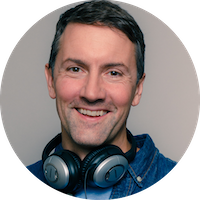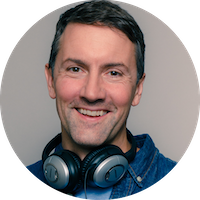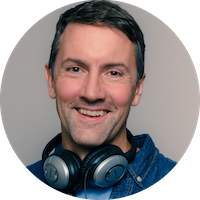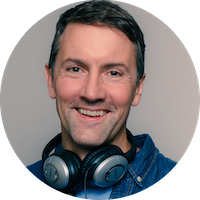The marketing industry has never been static. Over the past century, it has expanded from print advertising and signage to encompass TV and radio spots, sponsored quizzes and branded social media accounts.
But while marketing has grown more interactive and engaging, the core relationship between brands and consumers has also shifted.
“I think a lot of people grew up with the implicit deal where as an audience member, you agreed, ‘I'm going to watch ads in exchange for the stuff I want,’” said Steve Pratt, Vice President of Pacific Content.
Ads were the price of free TV, radio and digital media.
But modern technology and subscription services like Netflix let consumers block, skip and generally evade promotional interruptions. And so, with the balance of power tilting toward consumers, Pratt sees a new brand-consumer contract coalescing.
“Many marketers have realized that interrupting people doesn't actually make them like us more,” he said. “I think brands have really latched onto this idea: ‘We actually need to make things that people love if we want to earn their time and attention.’”
Hence the growth of content marketing, or what marketing guru Seth Godin has termed “permission marketing.” This is a strain of marketing people don’t just grudgingly accept, but actively permit into their lives. It aims not merely to boost brand awareness, but also to educate and entertain customers, forging lasting relationships with them.
“Real permission works like this: if you stop showing up, people complain, they ask where you went,” Godin writes.
A host of institutions resources, including the Content Marketing Institute, have sprung up to teach marketers the art of obtaining real permission. Often, it involves suspenseful storytelling, slick production, research, humor and audience-building — in other words, the tools of traditional media. In many cases, it’s hard to tell content marketing and traditional media apart.
Professionals in various areas of content marketing — including Pratt, who works in branded podcasting — spoke with Built In about their experience in the industry and offered tips for outsiders trying to break in.
What are your core responsibilities in your current content marketing role?
 Steve Pratt
Steve Pratt
Vice President of Pacific Content
A huge part of my job is education about podcasting best practices. It’s talking about how to make a real show instead of a thinly disguised infomercial. We do a lot of education around the power of telling stories more than doing interviews. Ultimately, if you want to build an audience and you want them to like you, you make a show that's creating value for them and respects their time and attention.
The other piece is audience development. A lot of companies have really fantastic powers to build audiences, but they don’t always think to use them. They have email newsletters or websites or mobile apps. If they have physical stores, they can use signage. They can reach a ton of people, but a show needs its own marketing plan
 David Mulqueen
David Mulqueen
Senior Marketing Manager at Odd Dog Media
It really varies by project, but let’s say we’re working on a Social Blueprint package. This is essentially a one-month engagement that revolves around research. First, our team will go through and provides a SWOT analysis of a client’s social and content compared to their competitors’ — that’s an analysis of their strengths and weaknesses, and the opportunities and threats they face given their industry.
From there, we figure out the target audience. With social campaigns, you really have to get the client to define that as specifically as possible. Our team does some research and audience segmentation, establishing what type of voice and tone and verbiage we need for our campaign can resonate with our target audience. From there it goes into the actual strategy and outlining, okay, we need you to create X pieces of content, but what are the timelines and what are the deliverables?
 Phoebe Neuman
Phoebe Neuman
Content Editor at Hawke Media
I’m responsible for strategizing and executing content, typically blogs that live on client’s e-commerce sites. Everyone at Hawke is really their own client lead and client expert. We don't have any account managers — we're the boots-on-the-ground team getting it done. So my main responsibilities are being in constant communication with clients about their goals, what they want their content to be, how to pull that off. Sometimes, it’s not super clear how content can align with business goals, so one of my big responsibilities is being an advocate for content. Then it’s coming up with topics, ideating, getting SEO resourcing and managing a team of freelancers to produce the content.
How do you define content marketing?
 Pratt: In audio, it’s brands turning into media companies by making people's favorite shows. If a brand makes a great show, they’re building a hugely valuable asset: their own audiences who voluntarily want to spend lots and lots of time with them. In the case of a podcast, people will opt in and spend 25 or 30 minutes on it, full engagement, week after week. We’re at the top of the sales funnel, so very much working on brand awareness and brand positioning. But for any business, there’s huge value in getting to spend that amount of time with people and build relationships with them.
Pratt: In audio, it’s brands turning into media companies by making people's favorite shows. If a brand makes a great show, they’re building a hugely valuable asset: their own audiences who voluntarily want to spend lots and lots of time with them. In the case of a podcast, people will opt in and spend 25 or 30 minutes on it, full engagement, week after week. We’re at the top of the sales funnel, so very much working on brand awareness and brand positioning. But for any business, there’s huge value in getting to spend that amount of time with people and build relationships with them.
 Mulqueen: There are really two different types of marketing: push and pull. Push marketing is advertising on radio, TV, anything where you push your product or your service in front of that audience. And on the pull side of things, you're trying to attract people who are already looking for your type of services. Writing content and optimizing that content from a search perspective, which is a lot of what I work on — that’s a pull approach. You’re creating that content and making it readily available, not necessarily when people are hanging out at home, but for when people are searching for it. It’s a little more dynamic than the content that lives on your website — your services or your about page.
Mulqueen: There are really two different types of marketing: push and pull. Push marketing is advertising on radio, TV, anything where you push your product or your service in front of that audience. And on the pull side of things, you're trying to attract people who are already looking for your type of services. Writing content and optimizing that content from a search perspective, which is a lot of what I work on — that’s a pull approach. You’re creating that content and making it readily available, not necessarily when people are hanging out at home, but for when people are searching for it. It’s a little more dynamic than the content that lives on your website — your services or your about page.
 Neuman: Here at Hawke, we define content marketing as a strategic marketing approach that focuses on creating high-quality, valuable and relevant content that will attract a brand's target audience and drive them to take action — often by answering the questions a brand's target customers are already asking, or providing information on topics they’re interested in. For me, the key difference between content marketing and plain old content is that content marketers can't just be focused on what makes for a good story. We have to get into the minds of our target audience to understand their pain points, problems or knowledge gaps, and then figure out the most compelling way to provide that information.
Neuman: Here at Hawke, we define content marketing as a strategic marketing approach that focuses on creating high-quality, valuable and relevant content that will attract a brand's target audience and drive them to take action — often by answering the questions a brand's target customers are already asking, or providing information on topics they’re interested in. For me, the key difference between content marketing and plain old content is that content marketers can't just be focused on what makes for a good story. We have to get into the minds of our target audience to understand their pain points, problems or knowledge gaps, and then figure out the most compelling way to provide that information.
For someone who wants to get into content marketing, what are key first steps?
 Pratt: In audio, I’d say listen to as much podcasting as you as you can. Get familiar with the medium. Dissect some of the shows that you like and figure out what you like about them.
Pratt: In audio, I’d say listen to as much podcasting as you as you can. Get familiar with the medium. Dissect some of the shows that you like and figure out what you like about them.
On the technical side, learn how to do an excellent audio recording. Learn how to mix it properly so you have consistent sound levels. People will not forgive things that hurt their ears or that they strain to listen to. I would also say double down on trying to learn as much as you can about metrics to be able to communicate how successful a show is or isn’t.
 Mulqueen: Writing talent definitely helps, especially if you're going to be the one executing content campaigns. I think it also requires a really good understanding of people — being able to put yourself in their shoes and understand your value to them, understanding that different people require different points of information to make a decision. It’s also really important for communicating and establishing credibility in terms of, Why we're creating this piece of content over this other one. For organic search and social media, it helps to have a creative streak and an analytical mind so you can use data to back up your strategies.
Mulqueen: Writing talent definitely helps, especially if you're going to be the one executing content campaigns. I think it also requires a really good understanding of people — being able to put yourself in their shoes and understand your value to them, understanding that different people require different points of information to make a decision. It’s also really important for communicating and establishing credibility in terms of, Why we're creating this piece of content over this other one. For organic search and social media, it helps to have a creative streak and an analytical mind so you can use data to back up your strategies.
 Neuman: Figure out what type of content you're really interested in organically and find ways to produce it. I have always loved fashion and fashion writing. UCLA, the college I went to, didn't have a fashion magazine, so I just made one myself and produced content that way and recruited people to help me. I got experience managing writers and editors that way. I think that really helped lay the foundation for me. And then also getting a basic marketing education. That was something that I learned on the job, but you can also take a marketing class or go to marketing workshops or take a webinar and really understand the history of content marketing and the basics.
Neuman: Figure out what type of content you're really interested in organically and find ways to produce it. I have always loved fashion and fashion writing. UCLA, the college I went to, didn't have a fashion magazine, so I just made one myself and produced content that way and recruited people to help me. I got experience managing writers and editors that way. I think that really helped lay the foundation for me. And then also getting a basic marketing education. That was something that I learned on the job, but you can also take a marketing class or go to marketing workshops or take a webinar and really understand the history of content marketing and the basics.
What technology plays a central role in your work?
 Mulqueen: In terms of tech, we use an online chat platform, Intercom. They make chatbots that hover in the corner of the screen, and through those, companies can communicate and engage with the readers who land on a piece of content. It’s partially an automated process. You can set a 90-second delay, say, before the chatbot pops up and says, ‘Hey, you’ve been here for a while, can we help you with anything?’ But then if the reader responds, an actual human at the company can engage with them. There’s a lot of power in that chatbot technology, in terms of generating content-based business leads.
Mulqueen: In terms of tech, we use an online chat platform, Intercom. They make chatbots that hover in the corner of the screen, and through those, companies can communicate and engage with the readers who land on a piece of content. It’s partially an automated process. You can set a 90-second delay, say, before the chatbot pops up and says, ‘Hey, you’ve been here for a while, can we help you with anything?’ But then if the reader responds, an actual human at the company can engage with them. There’s a lot of power in that chatbot technology, in terms of generating content-based business leads.
 Neuman: We’re fortunate enough to have access to a lot of SEO tools. The main ones we leverage for our clients are Ahrefs, BrightEdge and SEMrush. They help us tune into what the target audience for a specific client is organically interested in, and then our client can capture their eyes through that organic search. So for example, we’ve worked with a lot of CBD clients, and when we go into our tools and type in “benefits of CBD oil,” they generate a huge list of related keywords that people search.
Neuman: We’re fortunate enough to have access to a lot of SEO tools. The main ones we leverage for our clients are Ahrefs, BrightEdge and SEMrush. They help us tune into what the target audience for a specific client is organically interested in, and then our client can capture their eyes through that organic search. So for example, we’ve worked with a lot of CBD clients, and when we go into our tools and type in “benefits of CBD oil,” they generate a huge list of related keywords that people search.
We also really leverage Google suite. That’s not the most interesting answer, but we live and breathe in Google, and tools like Google Ads are crucial. We also use a platform called Yaguara, which is new. It’s a project management platform with analytics capabilities, so it really is like a one-stop-shop for our clients where they can see all of their action items across all of their channels. Hawke is actually one of the investors in it through our venture fund.
What’s the most challenging part of your role?
 Pratt: Education around how to measure success is a big challenge. Podcasting doesn't have the same type of metrics that YouTube or Facebook have. It’s tough to get details about who's consuming audio. So right now, a lot of it is how long each person who clicks play is listening in there, how much growth you're getting week to week in [terms of] new listeners coming in — things like that.
Pratt: Education around how to measure success is a big challenge. Podcasting doesn't have the same type of metrics that YouTube or Facebook have. It’s tough to get details about who's consuming audio. So right now, a lot of it is how long each person who clicks play is listening in there, how much growth you're getting week to week in [terms of] new listeners coming in — things like that.
 Mulqueen: The most challenging part of it, for me, is also something that I really enjoy, which is working to understand new industries. Sometimes you have to kind of dive in and familiarize yourself with a new client’s industry. There’s a lot of variety in our clients, and just a ton of new information to learn. It can take some time and you're working to meet deadlines – that can be challenging.
Mulqueen: The most challenging part of it, for me, is also something that I really enjoy, which is working to understand new industries. Sometimes you have to kind of dive in and familiarize yourself with a new client’s industry. There’s a lot of variety in our clients, and just a ton of new information to learn. It can take some time and you're working to meet deadlines – that can be challenging.
 Neuman: I would say communication. It’s easy for clients to say that for some reason, a sentence doesn't feel right, but it's hard to nail down what’s not right in such a way that I can go back to a freelancer and say, “Hey, can you fix that sentence to be X, Y, and Z?” It’s also just difficult because there are a lot of different stakeholders weighing in.
Neuman: I would say communication. It’s easy for clients to say that for some reason, a sentence doesn't feel right, but it's hard to nail down what’s not right in such a way that I can go back to a freelancer and say, “Hey, can you fix that sentence to be X, Y, and Z?” It’s also just difficult because there are a lot of different stakeholders weighing in.
Communicating how content works can be tough, too. Some clients come in and they're very, very focused on conversions — turning readers into customers. They're focused on return on investment and things like that. In general our clients are launching blogs, and you're not going to put up one blog post and then see a thousand people go and purchase the product that you mentioned the next day. It’s an investment that reaps returns over the course of six months to a year.
What’s the most rewarding part of your role?

Pratt: Getting to plug in a ton of interesting companies and all sorts of different smart people, and figuring out how to use creativity and storytelling to solve business problems. Hugely valuable and hugely satisfying.

Mulqueen: Seeing the results. At the beginning of every campaign we’re really setting some goals and benchmarks that we can work towards, and when we’re able to hit those goals and go above and beyond, I personally really enjoy that.
 Neuman: I think it's really just seeing a concept come to life and really excite a client when it lands on their desk. When I was in the editorial space and would cover luxury brands and whatnot, I would get messages from the brands that said, “Hey, your posts generated five sales.” That was always a hugely rewarding thing for me. It’s exciting to do the same in a more proactive way on the content marketing side for my clients. I always love when clients publish a piece to their blog and email me right away and say, “Doesn't it look so good?” That's really my favorite part.
Neuman: I think it's really just seeing a concept come to life and really excite a client when it lands on their desk. When I was in the editorial space and would cover luxury brands and whatnot, I would get messages from the brands that said, “Hey, your posts generated five sales.” That was always a hugely rewarding thing for me. It’s exciting to do the same in a more proactive way on the content marketing side for my clients. I always love when clients publish a piece to their blog and email me right away and say, “Doesn't it look so good?” That's really my favorite part.
What resources do you recommend for learning more about content marketing?

Pratt: I'm a huge Seth Godin nerd. I just think he’s such a beacon of smart thinking. He blogs every single day, and his blog is great. He has some books and courses that you can take. He’s got a fantastic podcast called Akimbo.
 Mulqueen: Well, I’d say to get familiar with the digital marketing industry as a whole. Search Engine Land is a great resource. So is Moz. Moz is one of the pioneers in terms of written content creation for the digital marketing industry. They put together an introduction to SEO, and they have a great blog. Their content has really helped people in content marketing stay up to date on industry trends and best practices.
Mulqueen: Well, I’d say to get familiar with the digital marketing industry as a whole. Search Engine Land is a great resource. So is Moz. Moz is one of the pioneers in terms of written content creation for the digital marketing industry. They put together an introduction to SEO, and they have a great blog. Their content has really helped people in content marketing stay up to date on industry trends and best practices.
 Neuman: I’ve found Facebook to be really helpful. There are tons of content marketing and digital marketing private groups that you can request to be added to. When I was first getting started, those forums where people were just posting questions about what their clients want, how to handle certain situations, how to tackle certain subjects, they were hugely helpful. Those will also often post jobs. One of my favorite Facebook groups is called The Freelance Content Marketing Writer. It’s run by Jennifer Goforth Gregory, the same woman who runs the Freelance Content Marketing Writer blog. Both are great resources.
Neuman: I’ve found Facebook to be really helpful. There are tons of content marketing and digital marketing private groups that you can request to be added to. When I was first getting started, those forums where people were just posting questions about what their clients want, how to handle certain situations, how to tackle certain subjects, they were hugely helpful. Those will also often post jobs. One of my favorite Facebook groups is called The Freelance Content Marketing Writer. It’s run by Jennifer Goforth Gregory, the same woman who runs the Freelance Content Marketing Writer blog. Both are great resources.
Where do you see the content marketing industry headed?
 Mulqueen: I think we’ll start to see the introduction of AI and a lot of content being created on that platform. There are already tools out there for social media, like Hootsuite, that allow you to automate that process, and there are already tools that help suggest topics for posts. I think a lot of content creation and the content pipeline will be automated at some point. I can see that happening in the next four or five years.
Mulqueen: I think we’ll start to see the introduction of AI and a lot of content being created on that platform. There are already tools out there for social media, like Hootsuite, that allow you to automate that process, and there are already tools that help suggest topics for posts. I think a lot of content creation and the content pipeline will be automated at some point. I can see that happening in the next four or five years.
 Neuman: I think the editorial world of traditional outlets like magazines and newspapers is shrinking. There are less and less jobs in that space, and I think really talented writers and editors are going to move into content marketing. It’ll be very interesting to see what they do, and how many more brands are going to start their own publications. Outdoor Voices just launched one this summer, and theirs is really beautiful and editorial. I think we're going to start to see more of that as the places where people get marketing content shift away from traditional publishers and towards brands.
Neuman: I think the editorial world of traditional outlets like magazines and newspapers is shrinking. There are less and less jobs in that space, and I think really talented writers and editors are going to move into content marketing. It’ll be very interesting to see what they do, and how many more brands are going to start their own publications. Outdoor Voices just launched one this summer, and theirs is really beautiful and editorial. I think we're going to start to see more of that as the places where people get marketing content shift away from traditional publishers and towards brands.





